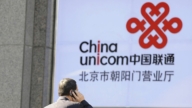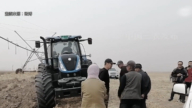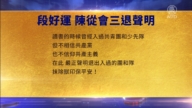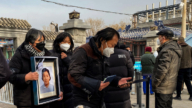【新唐人2013年09月06日讯】今年中国的高校毕业生数量达到创记录的699万人,同时也迎来了“最难就业季”。在未来几年,高校毕业生还会增加,再加上不断增长的新生劳动力,就业难度还将持续。中共官员也承认,中国就业的艰钜性和复杂性是任何国家都无法比拟的。什么原因导致这一现象呢?请看报导。
2013年中国高校毕业生人数达699万,比2012年多19万,创历史新高。然而招聘岗位却比往年下降15%。这一涨一落使得2013年成为“史上最难就业年”。
有媒体报导,中共人力资源和社会保障部官员也透露,今年可能有300万以上的大学生难以实现初次就业。
此前有媒体报导说,截至五月,上海高校毕业生的就业率仅两成﹔北京高校毕业生就业率不到四成﹔广东毕业生签约率仅三成,比较去年同期下降了10个百分点。
中共国家统计局的调查报告也显示,大陆农民工总数达到26261万人,也比上年增加983万人,但就业只有16336万人。
此外,未来5年间中国高校毕业生都会保持在700万左右的规模,到2020年,20到59岁就业年龄层的人口将达8.31亿的高峰。面对现状,中共人力资源和社会保障部部长尹蔚民不得不承认,中国就业问题的艰钜性和复杂性是任何国家都无法比拟的。
原《大公报》、《大周刊》新闻部主任朱健国认为,中国就业难是社会体制造成的,把民营企业、大学生自我创业的积极性都打消了。
政论专栏作家朱健国:“这种经济环境的恶化与当局的坚持政治体制的中国特色,打击民营企业,压制民营企业,而给国有企业有特权,它与这样一种政治倒退是有关的。”
朱健国表示,中共提出建设市场经济已经有20年了,但到今天造出了一个腐败、官僚控制的假市场经济。严重的腐败使得没有人敢去创业,辛辛苦苦做一年实业还不如炒套房子赚钱。朱健国认为,中国就业难实际上是中共拖延政治体制改革带来的恶果。
经济专栏作家段绍译也认同,市场经济是最好的经济制度,但中国经济体制目前还存在很多问题。
经济学者、北京师范大学MBA导师段绍译:“整体来说,我觉得造成今天就业难的原因,第一点是国有企业掌握了太多的特权,使民营企业没有得到公平的发展。”
根据中国企业联合会统计,2012年“中国企业500强”总收入为44.9万亿元,相当于2011年GDP总量的95.3%,其中,310家国有及其控股企业占81.87%。国资委资料也显示,2011年仅117家中央企业的收入就相当于同年中国GDP总量的42.9%,但所有国有企业的就业人口只占8.8%。
另外,国企高管的薪酬也反映了不平等:在2008年,中海油董事长年薪高达1204.7万元﹔南方航空公司亏损48.29亿,但是南航高管们的“腰包”反而增长近5成。
实际上,国有企业的特权也导致了这些垄断行业效率的低下:中国的上网费用是发达地区的数倍,网速却只有一半﹔中石油和中石化以不到世界原油1/10的开采成本,却以高于其他主要国家31%的税前价格,向公众销售同等品质的成品油。
民间智库《北京天则经济研究所》估计,仅在银行、石油、电信、铁路和食盐等五个垄断行业中,行政性垄断带来的社会福利损失就高达19104亿元。
朱健国:“可悲的是官方现在把就业难仅仅当成经济问题,当成一个就业问题。它不敢正视就业难背后的真正的症结所在,那么就只会贻误治病的最后机会,最终让这个社会走向崩溃。”
朱健国指出,目前中国社会的极度不公平、不公正,导致到处是戾气和怨气,由此不断引发群体冲突。这样下去是很危险的。
采访/易如 编辑/宋风 后制/王明宇
Year 2013, China’s Toughest Employment Year
China saw 6.99 million college graduates in 2013,
as well as the toughest job season in history.
Reportedly, the number of college graduates
will grow in the next few years.
The figure, plus the new working-age population,
will make employment difficulties continue.
The Chinese Communist Party (CCP) officials have
alleged to face an unparalleled difficult job market.
What is the reason behind it?
Let’s take a look at our report.
In 2013, China’s college graduates had peaked
at 6.99 million, an increase of 190,000 over 2012.
In contrast, job offers are down by 15%.
2013 has become “the toughest employment year" in history.
Reportedly, the CCP senior Human Resources officials have
said in 2013, over 3 million college grads may not get a job.
Earlier on, media reported that by May, only 20% of
recent graduates in Shanghai found jobs.
In Beijing, the figure was less than 40%.
In Guangzhou, it was 30%, 10% below that in 2012.
An official survey shows that China’s migrant workers
have reached over 260 million,
an increase in over 9.8 million in 2012.
Yet, only about 160 million of them are employed.
The survey indicates that in the next five years, China’s
colleges will maintain its graduates size of 7 million.
By 2020, China’s working-age population (20~59 years old)
will have peaked at 831 million.
Yin Weimin, the Human Resources Minister has openly
said that China’s employment issue is difficult and
complex, which is unparalleled in the world.
Former Hong Kong news director of Ta Kung Pao and
Da Zhou Kan, Zhu Jianguo, comments.
He says China’s tough job market is a result of
its current social and political system.
The system has eliminated self-employment enthusiasm
of private enterprises and of college graduates.
Zhu Jianguo: “The current economic deterioration is
related to its political system with Chinese characteristics.
The system cracks down on private enterprises,
but it entitles state-owned enterprises to privileges,
it is a political setback."
Zhu Jianguo says that 20 years have passed since the
CCP proposed to build an economy market in China.
Today, it has created a false market economy,
which is corrupt and bureaucratically controlled.
Serious corruption has scared away
people’s enterprising spirit.
A one-year effort in establishing a business earns
less than the gains pocketed from property speculation.
Zhu adds that China’s harsh employment situation has
actually resulted from the CCP’s delaying political reform.
Economist Duan Shaoyi thinks that a market economy
is the best economic system.
Yet, China’s economic system still has a lot of problems.
Duan Shaoyi: “Overall, I think one of the reasons
behind current employment difficulty is that
state owned enterprise (SOE)
have been given too many privileges.
Private enterprise have lacked
equitable chances for their development."
Data from the China Association of Enterprises shows that
in 2012, total revenues generated by China’s top 500
enterprises were about 45 trillion yuan.
It was equivalent to 95.3% of China’s GDP in 2011.
About 82% of the revenue came from 310 SOEs.
Official data shows that in 2011, 117 central SOEs
contributed to nearly 43% of the total GDP.
Yet, the number of SOEs staff only accounts for
8.8% of the total employed population.
SOE executives’ income has also exposed inequality.
In 2008, president of China National Offshore Oil Corp.
earned over 12 million yuan.
Southern Airlines, with an over 4.8-billion-yuan deficit,
gave its executives a 50% pay-rise.
In reality, the SOE privileges have led to low efficiency.
Internet access charges in China are several times
higher than that in developed countries.
Whilst the average broadband speed is only half.
The pre-tax price of refined oil sold by Petro China
and Sinopec are 31% higher than in western countries.
Yet, its mining cost is below 1/10 of the global norm.
Beijing-based Unirule Institute of Economics
has made an estimate.
In China’s five areas of banking, petroleum,
telecommunications, railways and table salts,
the administrative monopoly has caused a loss
of social welfare of up to 1,910 billion yuan.
Zhu Jianguo: “The sad thing is that the authorities
just view tight job market as an economic issue.
They dare not face the reason behind it.
So this will only miss the last opportunity for treatment,
causing the society to collapse."
Zhu Jianguo adds that currently, Chinese society is riddled
with extreme unfairness, hostility and resentment.
Mass conflicts have continued to emerge nationwide.
He warns that this is heading for disaster.



























